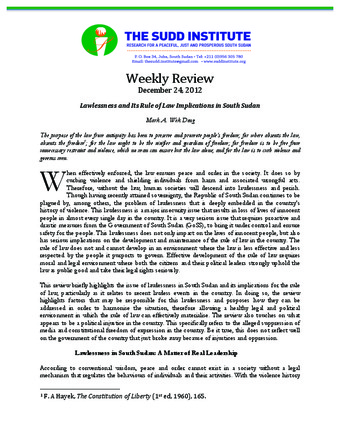Lawlessness and Its Rule of Law Implications in South Sudan
Publication Summary
Though having recently attained sovereignty, the Republic of South Sudan continues to be plagued by, among others, the problem of lawlessness that is deeply embedded in the country’s history of violence. This lawlessness is a major insecurity issue that results in loss of lives of innocent people in almost every single day in the country. It is a very serious issue that requires proactive and drastic measures from the Government of South Sudan (GoSS), to bring it under control and ensure safety for the people. This lawlessness does not only impact on the lives of innocent people, but also has serious implications on the development and maintenance of the rule of law in the country. The rule of law does not and cannot develop in an environment where the law is less effective and less respected by the people it purports to govern. Effective development of the rule of law requires moral and legal environment where both the citizens and their political leaders strongly uphold the law as public good and take their legal rights seriously.
This review briefly highlights the issue of lawlessness in South Sudan and its implications for the rule of law, particularly as it relates to recent lawless events in the country.
Mark A. W. Deng is a McKenze Postdoctoral Research Fellow at Melbourne Law School, the University of Melbourne, Australia, where he previously served as a Co-convenor of weekly seminars at the Centre for Comparative Constitutional Studies. He obtained his PhD from the University of Queensland in 2021. His research intersects the South Sudanese public law, customary law & practices and human rights. His work has been published in reputable international journals such as the International Journal of Law, Policy and the Family (Oxford University Press) and African Human Rights Law Journal (Pretoria University Law Press). His recent major work is a book on South Sudan’s constitutional law: Emerging Constitutionalism in South Sudan: Challenges and Opportunities (Hart Publishing 2025). Dr Deng’s work has also appeared in leading news outlets, including The Conversation–Africa where it has been read by thousands of people from around the world. He has presented his work at international public law annual conferences, particularly the International Society of Public Law and The Stellenbosch Annual Seminar on Constitutionalism in Africa. He has also given media interviews to the Australian Broadcasting Corporation (ABC) and the Sky News Australia.

